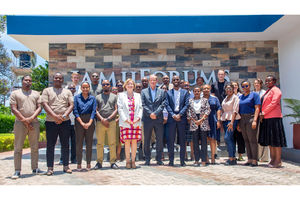EPZA calls for investment in skills to cope with changes

EPZA director of investment promotion and facilitation, James Maziku. photo | file
What you need to know:
- The rapidly changing technology necessitates a change of labour skills frameworks
Dar es Salaam. The advent of the fourth industrial revolution calls for a change in labour skills frameworks for Tanzania’s economy to keep pace with others in the new technological era, experts were told here yesterday.
The fourth industrial revolution is a new era that builds and extends the impact of digitisation in new and unanticipated ways to human beings.
It creates an opportunity for simplification of various tasks from farming to manufacturing, including the use of new technology in farming and industrial production, among others.
Speaking during a presentation to lecturers from 16 technical and vocational education and training institutes from Tanzania, Ethiopia and Kenya, the Export Processing Zones Authority (EPZA) director of investment promotion and facilitation, Mr James Maziku, said countries must change their labour skills frameworks in order to cope with requirements of the fourth industrial revolution.
He was speaking during an event where the lecturers – who were participating in the Eastern Africa Skills for Transformation and Regional Integration Project (EASTRIP) funded by the World Bank – visited EPZA offices in Dar es Salaam on Tuesday.
He said the fourth industrial revolution means that the skills required in both old and new occupations will change in most industries and transform how and where people work.
For his part, the EPZA director general, Colonel (rtd) Joseph Simbakalia, said Tanzania may become the most favourite investment destination for global investors if the country invested more in building a huge base of industrial skills.
Tanzania and the rest on the continent, he said, have almost everything needed by investors, which are abundant raw materials and energy sources, sufficient land and huge market, but lack of quality demand-driven industrial skills is a shortfall that impedes investment flow.
“Investors across the world are like flying birds because they always go where there is friendly environment to support their businesses,” he said on Tuesday.
He challenged the academicians and their institutes to focus on nurturing skilled labours that are much needed by industrial investors from different parts of the world.
By the end of the five-year EASTRIP project, the 16 institutes will have at least doubled their capacity to collectively enrol 20,000 students on an annual basis in both long-term and short-term training programmes in the targeted disciplines.
The project supports the development of highly specialised TVET programmes as well as industry-recognised short-term certificate level training, and will target regional priority sectors in transport, energy, manufacturing and ICT.
EASTRIP will be financed by the World Bank as an International Development Association loan of $210 million and a grant of $83 million.


